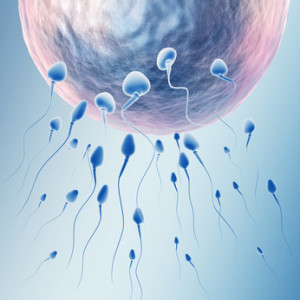Sperm carry very precious cargo: DNA. Their job is to deliver this DNA to the egg to meet the maternal DNA where two becomes one. A normal semen analysis will look at how good the sperm are at delivering this parcel i.e. how they can swim, how fast they can move. However if the quality of the goods within is compromised, successful conception may not occur.
The Sperm DNA fragmentation test therefore looks at the quality of the DNA within the sperm. Having high levels of DNA fragmentation can be a major cause of ‘unexplained infertility’, recurrent miscarriage and failed IUI or IVF cycles. It can easily be overlooked because high levels of DNA damage can be present even when sperm look normal i.e. you have a completely normal semen analysis.
High levels of DNA damage can occur under the following circumstances
– infection, either in or around the testicles (which may have little or no symptoms) or even a bad bout of flu or fever can temporarily cause DNA damage
– varicocele, like a varicose vein in the testicle
– with elevations of testicular heat such as with cycling, heated car seats, working with a laptop on your lap, possibly from carrying a mobile phone in your pocket, use of saunas or Jacuzzis.
– smoking
– increased age
– some medications
– exposure to some chemicals such as in paints, pesticides, or with occupational exposure
– obesity and overweight
– diabetes
– nutritional deficiencies
– genetic inability to use folic acid, such as occurs in up to 20% of the population to a high degree and to a minor degree in up to 40-50%
What can be done?
The DNA within sperm can be protected by antioxidants. Certain vitamins and minerals play an essential role here, especially zinc, selenium, vitamin C and vitamin E. Improving your diet by including plenty of fresh vegetables, fruit, nuts and seeds is a good place to start.
Supplements can also be very helpful but it is important to note that over-supplementation can be harmful. Antioxidants are also capable of dampening down some of the energy production that sperm need to swim fast toward an egg and successfully fertilise it. Therefore testing your levels of nutrients is important first and supplementing safely is the best approach.
Here at Glenville Nutrition we have special interest in this field and have published our own research on the topic (see below). We can organise Sperm DNA fragmentation tests and relevant nutritional tests to personally tailor your treatment plan. DNA fragmentation can be improved in most cases using nutritional and lifestyle changes. Call us on 01-2655977 to find out more or make an appointment.
Reprod Biomed Online. 2014 Jun;28(6):684-703. doi: 10.1016/j.rbmo.2014.02.004. Epub 2014 Mar 4.
Sperm DNA damage caused by oxidative stress: modifiable clinical, lifestyle and nutritional factors in male infertility.
Wright C1, Milne S2, Leeson H3.
Abstract
DNA fragmentation is an important factor in the aetiology of male infertility. However, it is still underevaluated and its inclusion in routine semen analysis is debated. DNA fragmentation has been shown to be a robust indicator of fertility potential, more so than conventional semen parameters. Men with high DNA fragmentation levels have significantly lower odds of conceiving, naturally or through procedures such as intrauterine insemination and IVF. Couples may be counselled to proceed directly to intracytoplasmic sperm injection as it is more successful in this group, avoiding costly procedures, recurrent failures or pregnancy losses; however, this treatment is not without limitations or risks. Ideally DNA fragmentation should be minimized where possible. Oxidative stress is the major cause of DNA fragmentation in spermatozoa. Endogenous and exogenous factors that contribute to oxidative stress are discussed, and in many cases are shown to be easily modifiable. Antioxidants play a protective role, although a delicate balance of reduction and oxidation is required for essential functions, including fertilization. Reducing oxidative stress may improve a couple’s chances of conception either naturally or via assisted reproduction. Sources of oxidative stress therefore should be thoroughly examined in men with high levels of DNA fragmentation and modified where possible. DNA fragmentation is an important factor in the aetiology of male infertility. However it is still underevaluated and its inclusion in routine semen analysis is still debated. DNA fragmentation has been shown to be a robust indicator of fertility potential, more so than conventional semen parameters. Men with high levels of DNA fragmentation will have significantly lower odds of conceiving naturally or through procedures such as intrauterine insemination and IVF. Intracytoplasmic sperm injection (ICSI) may be much more successful in this group, and couples may be counselled to proceed directly to ICSI, avoiding costly procedures, recurrent failures or pregnancy losses. However, ICSI is not without its limitations or risks. Ideally, DNA fragmentation should be investigated and minimized where possible in men trying to conceive naturally or through assisted reproduction technology. Oxidative stress is the major cause of DNA fragmentation in spermatozoa. Endogenous and exogenous factors that contribute to oxidative stress are discussed and in many cases are easily modifiable. Antioxidants play a protective role, although a delicate balance of reduction and oxidation is required for essential sperm function, including fertilization. Reducing oxidative stress may improve a couple’s chances of conception either naturally or via assisted reproduction treatment. Sources of oxidative stress therefore should be thoroughly examined in men with high levels of DNA fragmentation and modified where possible.
Copyright © 2014 Reproductive Healthcare Ltd. Published by Elsevier Ltd. All rights reserved.






